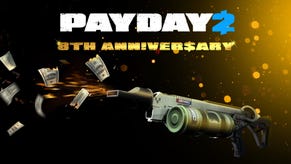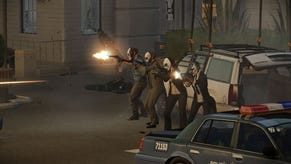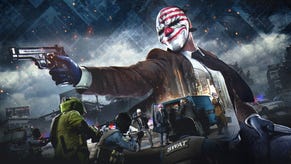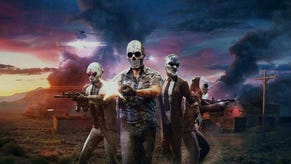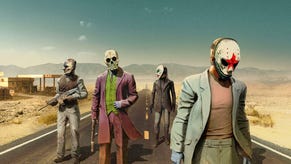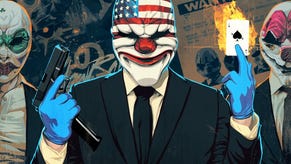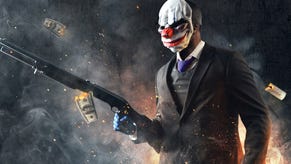The making of Payday 2: from '1.5' project to heavyweight sequel - part two
Payday 2 was a resounding success for Overkill Software, turning a profit before it even launched. VG247's Dave Cook continues his chat with director David Goldfarb about the development process and plans for 2014.
Part one of my Payday 2 making of interview is through the link. In it, we discussed the game's early concepts, the evolution of the stealth mechanic, what Goldfarb's experience on Battlefield brought to the table and more.
As David Goldfarb told me in part one of our interview, Payday 2 is a complex beast once you start drilling down into the RPG progression system, unlocking new perks and toying around with its stealth, espionage and coercion mechanics. In many ways its myriad systems render it beyond comparison to other shooters out there, but one big name I've often seen linked to Overkill's release is Valve's Left 4 Dead. Does he feel this is a fitting 'sell'?
”We all were hoping that the game would do well obviously, but it’s really nice to have such a strong response so early, so that you know you’re okay, and you can focus on whatever’s coming. I think there was a lot of – I wouldn’t say relief – but a ‘oh, that worked’ kind-of feeling, and so it makes it a lot easier to continue."
"I mean it's great that people compare it to Left 4 Dead," Goldfarb replied. "I think there's some pretty substantial differences, like the stealth and RPG stuff alone would put us in a whole other category, but there's no doubt that the first game was definitely Left 4 Dead-inspired, and I think no one's said anything else, as even the UI elements are kind of similar.
"It's better to be influenced by them than any others, but I think the game is very much its own thing right now, and while we appreciate the comparisons I think at this point, they are only legitimate in so far as it's a cooperative game where you sometimes fight waves if you desire. but the meta systems and the conceit - that it's a heist game and co-op, you can stealth and there's persistent RPG stuff and all those things - I think that's very, very different. I think the comparison starts to fail at that point, at least with Payday 2."
Payday 2's RPG elements really do set it apart. In part one of this feature we discussed how they weren't present at all when Goldfarb joined Starbreeze, and that the concept of adding in such a progression mechanic was met with serious doubt for the 35-40 strong team. The studio gave it a shot regardless and managed to make it all work, despite those initial fears and logistical problems. Goldfarb was instrumental to the RPG portion of the game, and helped ensure that no unlocked perks broke balance or felt redundant.
"Man, I went through so many iterations of those [skill] trees," Goldfarb recalled. "I'm still doing it now, and that's always a point of contention too like, 'should we really be changing it?' But it's like, every RPG ever has updates - any good one anyway - and you have to continue to refine things you know aren't working, but that's a whole other subject. Anyway [laughs] I did a draft of all the skills, we got feedback, I did another draft, more feedback, another draft and then we started to implement stuff. We'd put it in, find it didn't work then change it again. We then played a bunch and then changed it again. [Laughs] That's pretty much how it worked.
"It takes so long for people to understand how [skills] are going to change their experience, and the fact they work one way and weapons mods work another way, now there's armour and other things. There's so much complexity in the way things might interact that QA wants to constantly throw me off a building, I think. It was difficult enough in the old game with complexity in the levels, but now you've got complexity in the skills [laughs], weapon mods and potentially even from items.
"It's not really a good experience for someone who's trying to test a game and find all the possible things that can go wrong. That's the hard part, and you have to find the degenerate combinations as fast as you can, because otherwise people will play the game and go 'this works! Everybody, this works!' and then everybody does that thing, we nerf it, they get mad and then move on to the next thing."
”There’s something about these underdog sequels I personally like. I felt we were going to do well because the team was really good, the focus was good, the support was good, and the game itself – it became pretty clear, pretty fast that it was going to be very good."
Playing Payday 2 in its finished state today reveals Goldfarb's RPG tree to be a real game-changer. Depending on your skill make-up, you may find that your robber performs quite differently in any given situation. Therein lies the beauty of a well-crafted set of perks designed to tangibly change the experience. Despite further doubt from the small studio, Overkill and its colleagues at Starbreeze inched the game closer to launch, and started accepting pre-purchases over Steam. It was at this point that something incredible started to happen.
The game was making money. A lot of it, until eventually Payday 2 became profitable before it had even launched on Valve's marketplace. There was also the PS3 and Xbox 360 editions to consider, which were - at the time - still unreleased. The success - both critical and monetary - came as validation that the team's ambitious plan to broaden the Payday template far beyond those initial designs had paid off. Overkill had a hit on its hands, and the response among the staff was simply one of security and happiness.
"Everyone was really happy," Goldfarb recalled. "We all were hoping that the game would do well obviously, but it's really nice to have such a strong response so early, so that you know you're okay, and you can focus on whatever's coming. I think there was a lot of - I wouldn't say relief - but a 'oh, that worked' kind-of feeling, and so it makes it a lot easier to continue.
Pre-purchase is clearly a method of accepting early sales to narrow the profit gap, but did Goldfarb ever imagine that Payday 2 could break even like it did? He certainly had it in mind, but suggested that maybe not to the extent that it did. Internal discussions proved that the team as a whole felt confident where they once felt anxious. In this way - and many more - Overkill had grown as a unified outfit and Goldfarb added that the last time he had felt that way was when Battlefield: Bad Company 2 shipped.
"There's something about these underdog sequels I personally like," Goldfarb enthused. "I felt we were going to do well because the team was really good, the focus was good, the support was good, and the game itself - it became pretty clear, pretty fast that it was going to be very good."Regardless, Payday 2's launch was only the start of a longer project, one that has since become bolstered with free DLC and PC updates on a regular basis. There's plenty more to come.
Goldfarb stressed however, that here are no plans to add competitive PvP into the mix. In fact, it was never even considered throughout the entire development process. Co-op was always the focus, and Overkill refrained from going down the "rabbit hole" of familiar features like solo campaigns and online deathmatch. "That would have fucked us, being a small team," Goldfarb stressed.
”You can always make money and succeed if those two things are true, but the amount of money you make? Who knows. There’s Markus, ‘Notch’ out there and then there’s everybody else. It seems the world is much more open to this now than it ever has before, so it’s a good time to be an indie."
"Being spread out like that in terms of focus ... I think the fact that we able to just go, 'nope, we're making a cooperative game, and we're making it as good as we can,' was the probably the single best motivator, because there's so many other things we want to throw in there anyway. It was a good point of focus and I think it allowed the studio to make sensible calls about most things. I don't think that would have happened if we'd had fallen into the trap that it seems a lot of people do, which is, 'oh we've got to add this!' I've been on those teams."
But having done all of this with a small team and without the interference of a large publisher, Goldfarb still understands why studios often side with the big names out there. He noted that the industry is getting more competitive and that part of that heated market is due to the rush of new talent on Steam and mobile. He offered the relatable situation of looking at Steam and being simply overwhelmed by the choice on offer.
Chances are you've faced a similar dilemma during one of Valve's notorious sales. It's a question of spending money for the consumer, but it's a notable issue for some studios looking to earn a living. "It's certainly possible for people to succeed in the indie space," Goldfarb continued. "God knows, I mean most of the games I've enjoyed this year have been indies like Papers, Please, Gone Home, and I;m looking forward to my friend's game The Novelist. I played Rogue Legacy and any number of other things I've tried, the majority of them have been indie.
"There's definitely 'gamer's dollars' out there for those guys, but I think the bar is going to continue to get raised the same way it got raised in mobile, tablet and stuff. The only way to succeed in that space, financially, is to stay small and make good products, so I don't think that's going to change. You can always make money and succeed if those two things are true, but the amount of money you make? Who knows. There's Markus, 'Notch' out there and then there's everybody else. It seems the world is much more open to this now than it ever has before, so it's a good time to be an indie."
With that in mind, Payday 2 development will continue well into 2014 with new updates. It's all additive and an attempt to further hone the game's quality. Goldfarb admitted that he didn't know if the game's success was lightning in bottle, the result of perfect timing or purely the collective 20 years of experience at both Overkill and Starbreeze. Regardless, both teams are taking that bull by the horns and expanding the core appeal of Payday 2's embedded co-op experience.
It's a heist fantasy, so anything that facilitates that dream will be explored from this point. Unique selling points are hard to find and in many cases, go unpredictably viral. They often cannot be bought or manufactured in a focus group, so it makes sense for Overkill to focus on that special something Payday 2 can proudly call its own. Goldfarb confirmed to me that the, "Next six or so," content drops are going to be great, so it's clear that there's a degree of long-term thinking at play here.
"We're going to definitely support it in the long-term," Goldfarb concluded. "We have more coming, so we're just going to keep making stuff and hopefully people will keep coming to play it." No matter what gets added, he warned that it has to be compelling, regular and valuable enough to warrant constant play. Staying small and not losing focus on what got Overkill to this place here today, is instrumental to the team's ongoing output.
Payday 2 serves as proof that staying positive in the face of immeasurable odds and the dominance of big, well-funded sharks is a vital driver to attaining success in this industry as a solo, small or mid-tier studio. Skill, talent and a strong concept are also integral to enhancing your odds at market. If these ingredients are in place, anyone - even solo coders working unhealthy working hours at home - can move mountains.
As the industry rolls on and consumers grow more accepting to indie titles, the margin for success tips in favour of those who deserve it. Overkill is now a studio that has gone through the process and come out the other end stronger than ever before. This can only mean great things for whatever it works on next.






